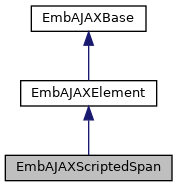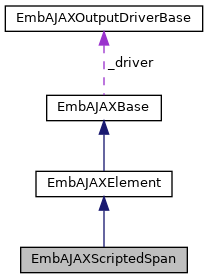A span element containing a custom javascript script, meant to creating custom dispays. More...
#include <EmbAJAXScriptedSpan.h>


Public Member Functions | |
| EmbAJAXScriptedSpan (const char *id, const char *script, char *rec_buffer=0, size_t rec_buffer_size=0) | |
| void | print () const override |
| const char * | value (uint8_t which=EmbAJAXBase::Value) const override |
| const char * | valueProperty (uint8_t which=EmbAJAXBase::Value) const override |
| void | setValue (const char *value) |
| void | updateFromDriverArg (const char *argname) override |
 Public Member Functions inherited from EmbAJAXElement Public Member Functions inherited from EmbAJAXElement | |
| EmbAJAXElement (const char *id) | |
| const char * | id () const |
| bool | sendUpdates (uint16_t since, bool first) override |
| virtual bool | valueNeedsEscaping (uint8_t which=EmbAJAXBase::Value) const |
| EmbAJAXElement * | toElement () override final |
 Public Member Functions inherited from EmbAJAXBase Public Member Functions inherited from EmbAJAXBase | |
| void | setVisible (bool visible) |
| void | setEnabled (bool enabled) |
| virtual EmbAJAXElement * | findChild (const char *id) const |
Additional Inherited Members | |
 Public Types inherited from EmbAJAXBase Public Types inherited from EmbAJAXBase | |
| enum | Property { Visibility , Enabledness , Value , FirstElementSpecificProperty , HTMLAllowed } |
 Static Public Member Functions inherited from EmbAJAXBase Static Public Member Functions inherited from EmbAJAXBase | |
| static void | setDriver (EmbAJAXOutputDriverBase *driver) |
 Protected Member Functions inherited from EmbAJAXElement Protected Member Functions inherited from EmbAJAXElement | |
| void | setBasicProperty (uint8_t num, bool status) override |
| bool | basicProperty (uint8_t num) const |
| void | setChanged () |
| bool | changed (uint16_t since) |
| void | printTextInput (size_t size, const char *value) const |
 Protected Member Functions inherited from EmbAJAXBase Protected Member Functions inherited from EmbAJAXBase | |
| void | printChildren (EmbAJAXBase **children, size_t num) const |
| bool | sendUpdates (EmbAJAXBase **children, size_t num, uint16_t since, bool first) |
| EmbAJAXElement * | findChild (EmbAJAXBase **children, size_t num, const char *id) const |
| void | printPage (EmbAJAXBase **children, size_t num, const char *_title, const char *_header, uint16_t _min_interval) const |
| void | handleRequest (EmbAJAXBase **children, size_t num, void(*change_callback)()) |
 Protected Attributes inherited from EmbAJAXElement Protected Attributes inherited from EmbAJAXElement | |
| byte | _flags |
| const char * | _id |
 Static Protected Attributes inherited from EmbAJAXBase Static Protected Attributes inherited from EmbAJAXBase | |
| static EmbAJAXOutputDriverBase * | _driver |
| static char | itoa_buf [8] |
| constexpr static const char | null_string [1] |
Detailed Description
A span element containing a custom javascript script, meant to creating custom dispays.
This class creates a element containing a custom script. The script to use is passed in the constructor. The span element itself is accessible using "this", inside the script.
The script may contain "this.receiveValue = function(value) { [...] };". This function will then be called, when the value is changed from the server.
If the scripted object allows the user to make changes, the script should call "this.sendValue(value);", when the value has changed. You will also have to set a large enough receive buffer in the constructor in this case!
- Warning
- This class is new, and its API may not be quite stable at the time of this writing. Feedback welcome.
Constructor & Destructor Documentation
◆ EmbAJAXScriptedSpan()
|
inline |
Constructor. See the class description for some detail on how to provide a script.
- Parameters
-
id unique id of the span script the script code. See the class description for details. rec_buffer if the script supplies values to the server (via in the script), a receive buffer is needed hold that value. Pass a pointer to a suitably sized buffer.this.sendValue(x);rec_buffer_size size of the rec_buffer.
Member Function Documentation
◆ setValue()
|
inline |
Send the given value to the client side script. Note that if you call this very often, the client will probably not see every value. It will only get to see the latest value that was set on each poll.
Further note that as of this writing, EmbAJAX does not check whether the value is actually changed, when you call this. You can avoid network overhead by making sure to call setValue(), only when something has actually changed. This may be changed in a future version of EmbAJAX.
For safety, the value string is always quoted when sending it to the client. This is not a problem as long as you are sending strings or plain numbers. To send more complex objects (such as an array, or even a function), your receiveValue() function should contain a call to eval().
- Parameters
-
value Note: The string is not copied, so don't make this a temporary.
◆ updateFromDriverArg()
|
inlineoverridevirtual |
override this in your derived class to allow updates to be propagated from client to server (if wanted). The implementation need not call setChanged().
Reimplemented from EmbAJAXElement.
◆ value()
|
inlineoverridevirtual |
const char representation of the current server side value. Must be implemented in derived class. This base class handles visibility and enabledness, only. Do call the base implementation for any "which" that is not handled in your derived class.
Reimplemented from EmbAJAXElement.
◆ valueProperty()
|
inlineoverridevirtual |
The JS property that will have to be set on the client. Must be implemented in derived class. This base class handles visibility and enabledness, only. Do call the base implementation for any "which" that is not handled in your derived class.
Reimplemented from EmbAJAXElement.
The documentation for this class was generated from the following file: